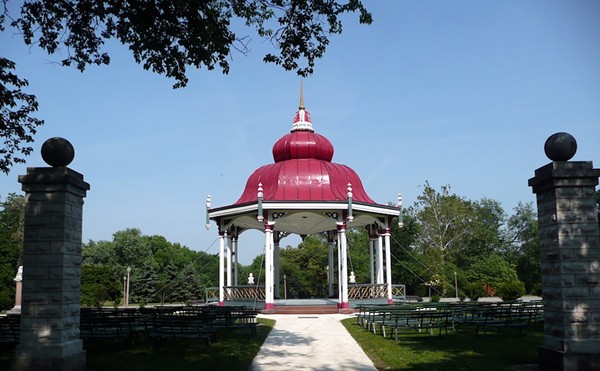Flora Place is particularly special for Bob and Irene Niemeier, who moved in seven years ago. The red brick is a little weathered, but the towering turret of their century-old home gives it the imposing appearance of a medieval castle. Architecturally, Flora Place -- a six-block enclave in the Shaw neighborhood of South City -- is a gem thanks to homeowners like the Niemeiers who believe in historic preservation, keeping up appearances and staying active in the neighborhood's business.
"This is not suburban living, where you see your neighbor once a year when your garage door is broken," Bob Niemeier says. "I choose to live here, and I don't want to see anything negative."
Take, for example, the Niemeiers' new next-door neighbors, who plunked down $280,000 last summer for a colonial-style brick home complete with freshly painted white shutters.
Mind you, these are not your ordinary neighbors, these three women who moved into 3670 Flora Place.
They're members of a wild and crazy bunch of do-gooders known as the Daughters of Charity, an order dedicated to serving the poor and downtrodden. The religious order, founded by St. Vincent de Paul and St. Louise de Marillac, does outrageous things like help victims of hunger, war and substance abuse; broken families; refugees; runaways; and persons living with AIDS.
On the surface, the women appear to be ideal neighbors. They're a peaceful group: nice churchgoing gals. The grounds around their home are well kept (although the Christmas decorations are still up). There are no junk cars up on blocks, no broken beer bottles on the lawn, no rusting appliances on the front porch. And the nuns currently are abiding with local covenants limiting to three the number of unrelated adults who can occupy a house. But the order, which bought the property after selling its provincial house to the University of Missouri-St. Louis, is expected to seek a variance that would allow more nuns to move in. That has neighbors raising hell.
"How are eight nuns going to share a bathroom?" Niemeier asks. "And bedrooms -- are the nuns going to bunk up? Granted, they're not big partyers, and it doesn't matter if there's three nuns or one nun or 10 nuns."
Niemeier hand-delivered letters to all the other residents, most of whom are Catholic, asking them to voice their opinions regarding the new neighbors. The overwhelming majority, Niemeier says, are worried about the precedent the nuns could set if they get a variance. What would be next? A convent? A bed-and-breakfast? Egad.
David Reid, president of the Flora Place Preservation Association, says the neighborhood group told the nuns before they bought the house that the association opposed the intended use of the property on the basis of their interpretation of the deed restrictions but that "our sentiment of opposition was essentially ignored."
Now things are at standoff, Reid says: "When we last spoke with a representative of the order, she made the statement that "I don't know what we'll do next.' There's never been an issue with the residents, except who bought the house, how they bought it and how they ignored the association."
St. Louis zoning administrator John Koch says he intends to enforce the zoning code, and the zoning code "doesn't say "nuns excluded'; it doesn't say "priests excluded'; it doesn't say "any kind of religious activities excluded.'" For example, Koch says, if the nuns were to use the house to provide temporary lodging for visiting nuns, he'd sue. "At that point and time, I'd consider them to be operating a bed-and-breakfast for nuns in there." And if the nuns get their variance, Koch adds, "a legal case could be made that the variance would go with the land and somebody else would be able to use it for nonconforming use."
Of course, Flora Place has its nonconformist residents who don't see a bunch of nuns as potential trouble.
"There is so much diversity already on the street. There are multigenerational families with adult children and four or five cars; there are people who are running their businesses out of their homes," says resident Lynne Cooper. "A community of Catholic sisters is a little bit of diversity we ought to be able to sustain without feeling like our neighborhood is going to be harmed."
The dispute has taken a toll on the sisters, says Daughters of Charity Provincial Sister Mary Therese Sedgwick. She still hopes the order can work out some accommodation with the neighborhood association. "The controversy has been very difficult for them. We've been through quite a challenge, and this hasn't made it any more pleasant."
Niemeier concedes that the nuns on Flora Place, who declined to talk to the RFT, have taken the opposition personally: "The Daughters think it's a problem with them as individuals. One was almost in tears."
But Niemeier, who sees the Daughters of Charity as a well-heeled organization with pricey lawyers and plenty of clout, says there's nothing personal in his opposition.
"The Daughters of Charity are supposed to work and live among the poorest of the poor," he says. "I don't think I fit that bill. It's not a question of a group of nuns owning a home or a fraternity owning a home or a halfway house for unwed mothers. It's a question of private ownership of historic homes vs. corporate ownership of large buildings."





